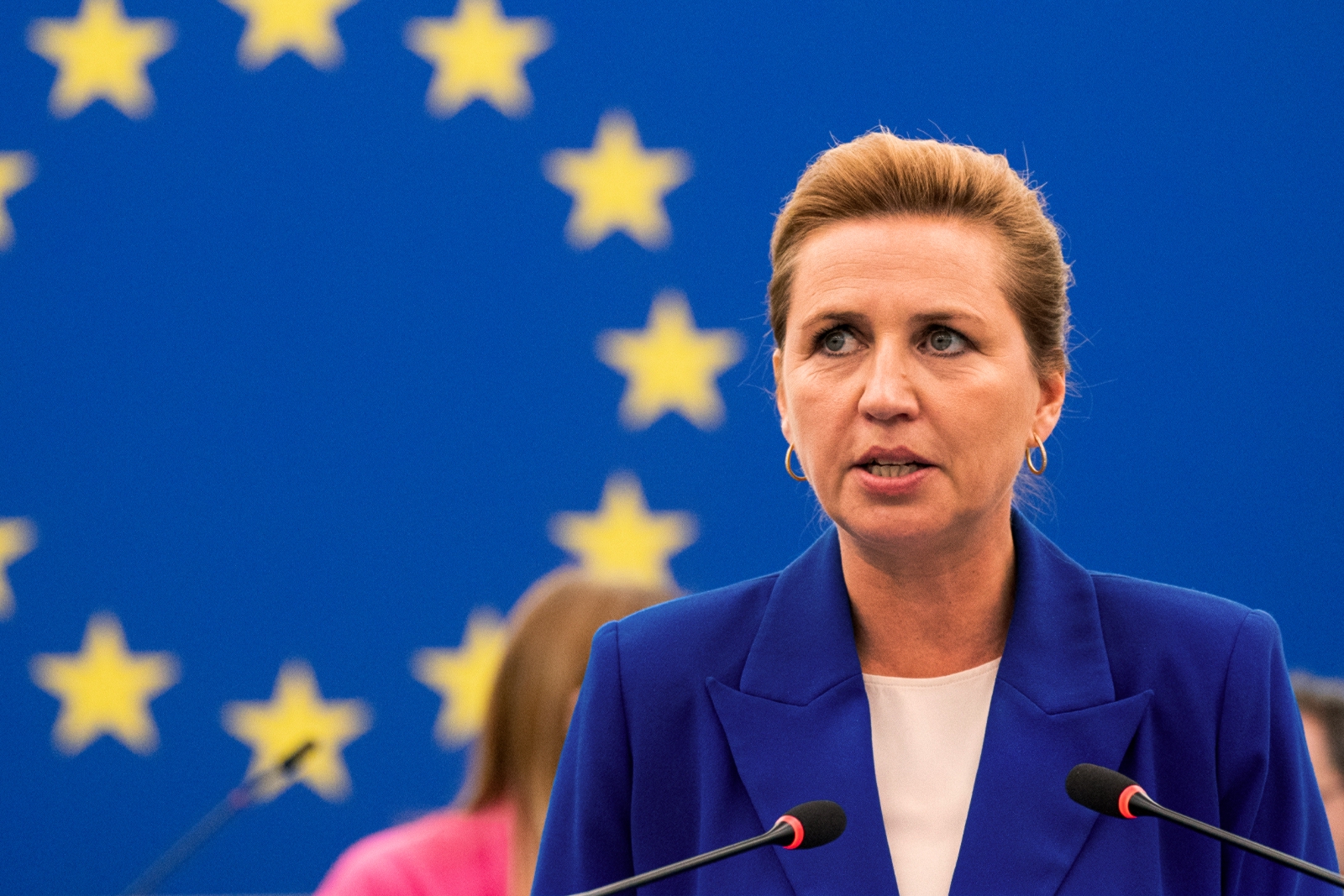
After Trump’s Greenland Gambit, Denmark Bets on Europe
In early July, Denmark took the EU’s “top job,” assuming the rotating presidency of the 27-member bloc for the next six months. It inherited a docket as heavy as at any point in recent memory: war in Ukraine and the Middle East, a climate crisis that refuses to wait, and fraying global trade ties that test Europe’s ability to act in concert.
Skeptics often argue that the EU is too unwieldy to shape events beyond its borders. Even so, on July 1, Denmark—a country known not so long ago for its Eurosceptic reflexes—took over the Presidency of the Council of the EU, a role that will help steer the Union’s agenda through the end of 2025.
It is the eighth time the small Nordic state has sat at the EU’s “top table.” Under the banner “A strong Europe in a changing world,” Copenhagen promises to prioritize a secure, competitive, and green Europe. The agenda is unsurprising and daunting: the wars in Ukraine and the Middle East, migration and border management, defence policy, and the politically fraught question of EU enlargement.
Backed by a Social Democrat–led government, Denmark says it will pair security with green innovation. Officials trail a presidency of “bold leadership” on progressive fronts: accelerating the green transition; cutting back bureaucracy that throttles sustainable businesses; defending rule-of-law standards across the bloc; and advancing digital sovereignty and competitiveness so Europe can better hold its own against the United States and China, from cloud standards and AI governance to the resilience of critical supply chains.
Perhaps most striking is the government’s insistence on keeping enlargement on track—particularly for Ukraine, Moldova, and the Western Balkans—arguing that merit-based integration can serve as a lever for democratic resilience and continental solidarity. That push does little to calm critics who fear the EU will press ahead with expansion this year regardless of whether candidates have truly met the bar. With migration still roiling national politics, the costs and social pressures of taking in new members remain near the top of the agenda.
Anders Vistisen, a Danish MEP with the right-wing Patriots for Europe group, is already sounding the alarm about what he calls Brussels’s “blind rush” to admit new states. “We are talking about eight candidate countries with a combined population of more than 90 million people, and an extra cost to European taxpayers of more than EUR 75 billion. This is not enlargement – it’s a ticking time bomb.”
In his telling, candidates such as Ukraine, Moldova, Serbia, and Albania still fall “significantly short” on governance, transparency, and economic stability—deficits, he argues, that would strain the Union’s finances and social fabric if admitted prematurely. “The EU must get its own house in order before adding new rooms. European taxpayers should not be forced to bankroll unstable, low-income countries that threaten our social cohesion.”
Denmark launched its presidency with a flourish in Aarhus, weaving youth-engagement initiatives and cultural events into the opening ceremonies. Workshops with students, public debates, and performances were designed to signal that the EU’s work is not only for technocrats in Brussels but for citizens who will live with the consequences. For Socialists in the European Parliament, this is precisely the spirit they hope to see: a presidency that marries energy independence and solidarity with investment in security, and that translates these ambitions into a coherent, people-oriented agenda capable of strengthening Europe’s standing in the world.
What is clear is that Denmark—the land of the Little Mermaid and Tivoli Gardens—is a different political creature than in the 1990s referendum era. One explanation, as Politico has noted, is President Donald Trump, whose blunt talk about taking Greenland “one way or another” rattled a country accustomed to quiet competence. If the world feels less stable, Europe looks like a more necessary anchor.
Recent polling suggests Danes see their future firmly bound up with the continent. In March, a Berlingske survey found that 92 percent of respondents agreed Denmark should rely more on the EU than on the United States for its security. That sentiment aligns with the message from António Costa, president of the European Council, who helped launch the Danish term by praising Copenhagen’s “unwavering support to Ukraine from day one,” a record he says has “set an example for strong leadership in Europe and to the world.” Such leadership will be called upon repeatedly in the weeks and months ahead as the war in Ukraine grinds on with no clean end in sight.
Expectations for the presidency are split between ambition and caution. Some cheer Denmark’s priorities; others are already tabling demands. The European Conservatives and Reformists (ECR) group, responding to the presidency program presented to the Parliament, wants a “firmer and more realistic” migration policy: tougher external border control, more effective returns, and strategic partnerships with third countries. On Ukraine, the ECR presses for a reaffirmation of the EU’s “steadfast commitment” to Kyiv’s sovereignty, territorial integrity, and right to self-defence. On security and defence, it wants member states to move faster on spending, capability development, and cooperation so the Union has the strategic tools to meet evolving threats.
Prime Minister Mette Frederiksen, outlining her priorities, casts the moment in stark historical terms. The EU, she says, faces its greatest set of international challenges since the 1940s: intensifying geopolitical and economic competition, and rising levels of conflict. Europe must take more responsibility for its own security by investing and strengthening the defence industry “so that by 2030 the EU will be able to defend itself.” To counter Russia’s aggression, she adds, Europe must support “Ukraine’s fight for peace and freedom.” The aid, in her telling, is not charity but a strategic investment in Europe’s own defence.
Frederiksen’s domestic message overlaps with her European one: citizens expect new answers on migration. That means stronger external borders, a lower influx of irregular arrivals, and returns that are faster and more efficient. Just as critical, she argues, is restoring Europe’s economic edge. A competitive and green Europe is becoming a top priority as the continent slips against rivals. On climate and biodiversity, she wants the Union to keep pushing a global green transition and to agree—quickly—on an ambitious 2040 climate target that offers predictability to companies and signals continued leadership.
Budget politics lurk behind almost every file. On the EU’s next long-term budget, Frederiksen favors making the framework more flexible and simpler, better equipped to handle shocks, and more tightly focused on the bloc’s political priorities. Many MEPs broadly welcome the twin emphasis on defence and competitiveness, and agree that Europe must develop its defence industry and deepen cooperation with allies if it hopes to shape events rather than merely react to them.
Roberta Metsola, the center-right president of the European Parliament, puts the moment bluntly: Denmark takes the wheel “at a time of war on our continent, global trade tensions and economic pressure.” Security, sustainability, and competitiveness are the right focus, she says—“from strengthening our defence to cutting red tape for business, from energy security to digital leadership—Europe must act.” The presidency’s slogan, “A strong Europe in a changing world,” captures the brief, and Metsola argues Denmark is well placed to lead by example.
Beyond Brussels’s institutions, the business community has its own checklist. With uncertainty rising, the message from boardrooms is that unity and determined action to strengthen Europe’s economy are more urgent than ever. Fredrik Persson, president of BusinessEurope, the Brussels-based employers’ organization, says industry counts on the presidency to “foster the broad partnership needed to meet the historical challenges the EU is facing.” He urges Denmark and its partners to prioritize eight actions in the coming months, from a more ambitious trade policy and rapid implementation of the single market strategy to further measures that reduce energy costs and deliver tangible simplification of regulatory requirements.
Summer in Europe usually means a collective easing of the throttle. But with multiple wars ongoing, fresh fallout from the Trump-era and current tariff fights, and a thicket of other urgent files, the season offers little respite. If anything, Denmark’s in-tray is already stacked high—and could be close to overflowing well before the end of August. The coming months will test Denmark’s reputation for pragmatic problem-solving: can a once-skeptical member state coax a sometimes-skeptical Union into acting with clarity and speed?
